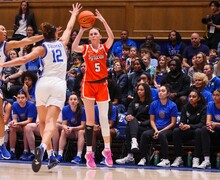Inside Jim Boeheim’s revamped scheduling philosophy
Clockwise from top left: Alexandra Moreo | Senior Staff Photographer, Todd Michalek | Staff Photographer, Codie Yan | Staff Photographer, Sabrina Koenig | Staff Photographer
Syracuse has made a point to schedule a variety of teams during its nonconference slate to prepare for the season.
Jim Boeheim scooted to the edge of his seat. He was in his office late this summer musing over the upcoming season, rummaging through some papers on his desk. He pulled out Syracuse’s 2018-19 season schedule. As he rattled off the Orange’s first 10 opponents, he raised his eyebrows and took a deep breath.
“Not easy,” he said.
Boeheim intended to make things this way, crafting a sort of early-season schedule that doesn’t look like the one SU played previously. He said he believes eight or nine teams on the nonconference schedule this season will make the NCAA Tournament. Until recently, that’s not how it went: The Orange has long been known for playing “cupcake” opponents to accumulate easy wins.
But Boeheim has developed a new theory: Play stronger nonconference opponents. Last season, the Syracuse nonconference strength of schedule was 18th in the country, per CBS Sports. But Kenpom.com, which accounts for adjusted and defensive ratings, placed the Orange 163rd in the same category.
Boeheim credits the Orange’s last two NCAA Tournament appearances — the Final Four in 2016 and a near Sweet 16 victory over Duke last season — to the Orange’s increasingly difficult schedule before Atlantic Coast Conference play.
“That’s why we got in the tournament last year,” Boeheim said. “Even that Buffalo win was a big reason we got in the tournament last year. Our strength of schedule was the best of all the schools on the bubble — that’s why we got in. We try to play those teams in nonconference, now.”

Laura Angle | Digital Design Editor
For years, critics have seen Syracuse’s nonconference schedule — including annual matchups against Cornell, Colgate, St. Bonaventure, and so on — as a means for the Orange to beat up on lesser teams and rack up easy wins. Most other perennial powers are no different in this sense, including North Carolina and Villanova. In many ways, it’s become the nature of the sport.
“Some people may want Syracuse to play a tougher nonconference schedule,” said ESPN college basketball analyst Jay Bilas,. “But it’s not necessary. Syracuse makes the tournament as often as anybody and does very well when it gets there …The NCAA likes to say, ad nauseam, ‘full body of work.’ Well, if it’s full body of work, what difference does it make what your nonconference schedule looks like?”
Boeheim said mid-majors want to play at the Carrier Dome early in the season because they get paid, and their players get an opportunity on a big stage. Syracuse pays visiting schools a total of several hundred thousand dollars for early-season games. The price has only risen, Boeheim said, which has prompted teams to play in more tournaments — such as the 2K Classic at Madison Square Garden — at neutral sites with lower costs.
But that’s not why SU welcomes lesser-known teams. The Orange play a tough conference schedule in the Atlantic Coast for two months — with annual meetings against often-ranked opponents such as Duke, North Carolina, Miami, Louisville and Virginia — so playing mid-majors early in the year functions as a proving ground ahead of conference play.
Several players said they like the schedule the way it is: hard. Senior point guard Frank Howard said he’d rather play probable NCAA Tournament teams early in the year, although he clarified that “basketball is basketball. We just need to play, get familiar, get in our spots,” regardless of how good the other team is.

Syracuse’s nonconference games have come beyond Syracuse, including a game aboard the USS Midway in San Diego, California, six years ago. Daily Orange File Photo
Sophomore forward Oshae Brissett said the early games a season ago helped him get up to speed with the change in pace of play from high school to college. Senior center Paschal Chukwu agreed. He also said the first dozen or so games last year provided him time to develop a feel for his place in the 2-3 zone and nurture an understanding of his place in the offense.
“It’s kind of like getting in the groove again,” Chukwu said. “It’s all about in playing in as much games as possible with my teammates so they can trust me more in game-time situations.”

The Orange took on Connecticut last year at Madison Square Garden in the 2K Classic. Syracuse tips off against the Huskies on the same floor on Nov. 15. Matthew Gutierrez | Senior Staff Writer
Asked about this year’s nonconference slate, Boeheim said Morehead State, Colgate and Cornell are all improved. Connecticut, Iowa and Oregon, he said, could be in the 2019 NCAA Tournament.
“Northeastern is picked to win their league,” Boeheim said. “Old Dominion’s picked to be in the top of their league. Buffalo is picked to win their league. Arkansas State is good, St. Bonaventure is good.”
“We could’ve put five teams like Savannah State,” Boeheim went on, “and nobody would have said much. Those five games, they’re as good as playing a lower team from a so-called Power 5 conference. They’re just as good as a lower Big Ten team or SEC team or Pac 10. These teams can all play. We lost one of those games last year and we could lose one this year. They are not easy games.”
Another fast-growing program is Washington, where Boeheim’s former assistant, Mike Hopkins, enters his second season. Asked about a potential Washington-Syracuse matchup, which would feature a Boeheim-Hopkins reunion, Syracuse’s head man didn’t flinch.
“Doubt it,” Boeheim said. “They’re too far away.”
— Staff writer Danny Emerman contributed reporting to this article.
Published on November 7, 2018 at 11:31 pm
Contact Matthew: mguti100@syr.edu | @MatthewGut21






